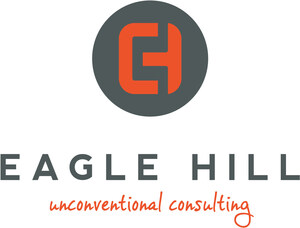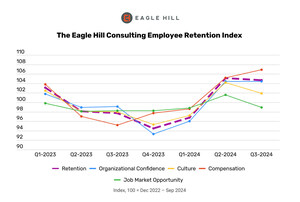New Eagle Hill Research Finds Government Agency Parents Struggling With Burnout, Flexibility, and Productivity
ARLINGTON, Va., Oct. 29, 2024 /PRNewswire/ -- On the heels of United States Surgeon General Dr. Vivek Murthy's recent advisory that the high level of parental stress is a public health concern, new research from Eagle Hill Consulting finds parents working for government agencies are 1.5 times more likely to report burnout as compared to parents nationwide. In a recent survey of U.S. employees, 52 percent of parents working in government report burnout on the job, while 35 percent of parents nationwide indicate they are burnt out at work.
In terms of the key drivers of burnout, parents working in government report their workload (67 percent), staff shortages (50 percent), and time pressures (50 percent) are the top causes. The research also finds burnout is greatly impacting how parents function at work. Parents employed by agencies are nearly twice as likely to say burnout greatly impacts their job performance and ability to service customers as compared to non-parents.
Read Eagle Hill's new research, Government Parents Are Not OK.
"It's surprising and alarming to see the level of burnout among government employees with children is substantially higher than parents nationwide," says Melissa Jezior, president and chief executive officer of Eagle Hill Consulting. "Our findings underscore an urgent need to understand what's driving this unique strain on government parents. Traditionally, parents have been drawn to government work for its stability, mission-driven nature, and work-life balance – so our new research signals a troubling disconnect."
"Given these findings, federal, state, and local government employers must be proactive in understanding the pressures facing their workers with families, and they must be willing to implement solutions that will alleviate parents' burnout. For example, flexible work arrangements often can relieve some of the pressures on agency workers, whether its modified schedules or allowing hybrid work arrangements where feasible. Failing to act will only mean the revolving job door will spin even faster, and agencies will have a tougher time delivering on their mission," Jezior said.
Parental burnout in government is particularly alarming because, as the survey reveals, these workers are more likely to make career changes for better work-life balance. If agencies fail to address burnout and flexibility concerns, they risk losing talented workers. Eagle Hill's nationwide data also finds:
- Government parents are far more likely (58 percent) than their non-parent peers (38 percent) to consider looking for new jobs should their employer reduce flexibility around remote and hybrid work.
- Parents working in government are nearly twice as likely as their peers without children to accept a pay cut in exchange for more remote work options.
- Government parents are more optimistic about their job prospects, with 46 percent believing they could easily find a higher-paying job, compared to just 34 percent of non-parents.
Eagle Hill recommends agencies support government employees with children by focusing on five fundamentals:
- Investigate the root causes of parental stress in government. To understand why government parents report higher stress and burnout, leaders must move beyond conversations to broader, proactive engagement with their workforce. This includes actively seeking to understand the factors driving parents' disproportionate stress—such as workload, flexibility, and childcare challenges—through focus groups, targeted surveys, and continuous feedback loops.
- Prioritize workforce planning. Government parents say that workload and staff shortages are top causes of burnout at work. Conducting workforce planning will help agencies to adapt to changing workforce dynamics quickly.
- Embrace flexible work policies. Government parents clearly value workplace flexibility. When possible, encourage and expand telework, flex schedules, and hybrid work arrangements.
- Talk openly about employee burnout. Half of government employees say they have told their manager that they feel burned out, but most say their managers did nothing to help reduce their stress. Bring burnout into the light by opening up dialogues and helping parents connect to each other for support.
- Set the tone from the top. Senior personnel within government agencies must lead by example on this issue. This can mean supporting employees who need to take leave to care for sick children or shifting schedules to accommodate school pick-up and drop-off times.
Eagle Hill's findings are based upon the following surveys conducted by Ipsos:
- Eagle Hill Consulting Workplace Flexibility Survey conducted in June 2024 containing responses from 570 federal, state, and local government workers.
- Eagle Hill Consulting Government Employee Burnout Survey conducted in August 2024 containing responses from 531 federal, state, and local government workers.
- Eagle Hill Employee Consulting Retention Index Survey conducted in Q3 2024 containing responses from 514 federal, state, and local government workers.
Respondents were polled on a range of workforce topics including burnout, workplace flexibility, organizational confidence, culture, compensation, and job market opportunity.
Eagle Hill Consulting LLC is a woman-owned business that provides unconventional management consulting services in the areas of Strategy & Performance, Talent, and Change. The company's expertise in delivering innovative solutions to unique challenges spans across the private, public, and nonprofit sectors. A leading authority on employee sentiment, Eagle Hill is headquartered in the Washington, D.C. metropolitan area, with employees across the U.S. and offices in Boston and Seattle. More information is available at www.eaglehillconsulting.com.
SOURCE Eagle Hill Consulting LLC

WANT YOUR COMPANY'S NEWS FEATURED ON PRNEWSWIRE.COM?
Newsrooms &
Influencers
Digital Media
Outlets
Journalists
Opted In






Share this article